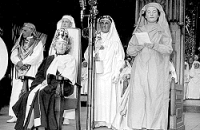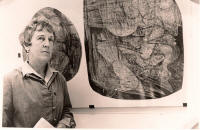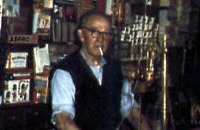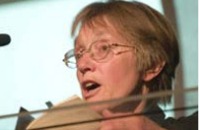Culture
Land of Poets
...and other famous people...
The Llŷn Peninsula seems to bring out the poet in people. There are plenty of Eisteddfod participants living on Pen Llŷn and many who come here seeking inspiration.
|
|
Dilys Cadwaladr - poet |
Brenda Chamberlain - artist and poet |
|
|
Owen Griffith - herbalist |
Christine Evans - poet |
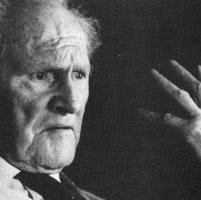 R S Thomas
R S Thomas
1913 - 2013
R.S.Thomas Centenary
R.S.Thomas was perhaps the greatest poet of Wales writing in the English Language in the 20th century. He was the vicar of Aberdaron, Llanfaelrhys and Rhiw from 1967 - 1976, and spent his early retirement in Rhiw where he wrote most of his nature poems. We are remembering him in Aberdaron in 2013, a hundred years after his birth. Many of our visitors, mostly in ones and twos, are R. S. Thomas pilgrims. There is an introduction to his life, full of controversy, and his poems in a display in St. Hywyn’s Church.
R.S. Thomas was Vicar of St Hywyn's, Aberdaron from 1967 until he retired on Easter Sunday 1978. He was a priest for more than forty years, serving in parishes in many parts of Wales.
Ronald Stuart Thomas was born in Cardiff on 29 March 1913. The first five years of his life were spent moving from port to port, including Liverpool, following his father who was a sailor in the Merchant Navy.
The family settled in Holyhead, Anglesey, at the end of the First World War. After reading Classics at the University of Wales, Bangor, and theology at St Michael’s College, Llandaff, he was ordained in the Church of Wales in 1936. He married a noted painter, Mildred (Elsi) Eldridge, and their son, Gwydion, was born in 1945.
R.S. began learning Welsh as an adult in the early 1940s and was a passionate advocate of Welsh language and culture, founding Cyfeillion Llŷn. After he retired he lived first at nearby Rhiw, where he continued his lifelong interest in bird watching. His wife died in 1991 and R.S. moved back to Anglesey in 1994. He married Elisabeth (Betty) Vernon, a widowed Canadian, in 1996. He died on 25 September 2000 at his last home in Pentrefelin, near Criccieth.
R.S. published almost 30 books of poems in English, beginning with The Stones of the Field (1946). His prose works in Welsh included an autobiography, Neb (No-one) and Blwyddyn yn Llŷn (A Year in Llŷn) – published in an English translation by Jason Walford-Davies in Autobiographies (1997).
R.S. was much honoured for his contribution to literature, winning the Heinemann Award (1955), the Queen’s Gold Medal for Poetry (1964), the Cholmondeley Award (1978), and the Welsh Arts Council Literature Award four times. He was nominated for the 1996 Nobel Prize for Literature.
More information:
-
St Hywyn's Church - the church bookshop stocks one of the best selections of RS Thomas books in North Wales.
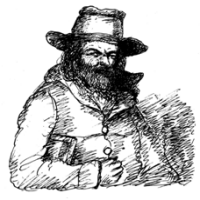 Dic Aberdaron (1780-1843)
Dic Aberdaron (1780-1843)
Dic AberdaronAn extract from “The Matter of Wales” by Jan Morris
Richard Jones was in all respects a complete failure. He is famous not so much for what he did, as for what he might have done, not for his triumphs over adversities, like most national heroes, but for his patrician refusal to adjust to them. He was born in 1780 the son of a fisherman, and for a time took to the sea too, but early discovered in himself a precocious gift for languages, and this was the end of him. He gave up gainful employment for the rest of his life, and instead took to wandering around the country learning new languages, translating foreign books and working upon ephemeral literary projects.
He was the very image of a tramp. Thickly-bearded, floppy-hatted, often wearing a brilliantly bright blue Dragoon’s jacket with silver epaulettes, generally bare-footed, nearly always filthy, accompanied more than likely by an adopted stray cat, with a harp and a horn slung over his back and every pocket of his raggety coat bulging with books - accoutred thus, he was a familiar figure in the lanes of North Wales, at the houses of country gentlemen or parsons where he stopped for sustenance and intellectual encouragement, on the waterfront at Liverpool, where he liked to practice his languages on foreign sailors, in the drawing-rooms of London Welshmen and even in Dover, where he enjoyed expressing horrifyingly subversive views to the soldiers of the garrison.
Dic was described by a contemporary as “innocent as a child, but cunning as a serpent”. He is said to have mastered fourteen languages, and to have had a smattering of many more, and he was greatly respected in his own lifetime for his prodigious self-taught intellect, but he was also a sponger, a squabbler, and a distinctly unreliable protégé. Time and time again, he was befriended by men of substance, who often put him up for a time, lent him books or money, or commissioned translations from one language or another. He let most of them down, in one way or another, and was engaged almost all his life in quarrels and recriminations.
It is often impossible, even now, to disentangle his truth from his fiction. Could he really speak all those languages? If he knew their words, did he always understand their meanings? Possibly not, but now as then people prefer to give him the benefit of most doubts, so that to this day Welsh schoolchildren are taught to view him with respectful regard. Dic’s only lasting creation was a mammoth Welsh-Greek-Hebrew Lexicon, never alas to be published, but there are young Welshmen still who see this way of life as admirable - a life full of aspiration and private satisfaction, but utterly outside the usual canons of success. Dic owned nothing at all but his books, his harps and his horn, and he lost most of them at one time or another. He died in 1843, and despite his atheist beliefs was buried in the churchyard of St. Mary’s church at Llanelwy [St. Asaph] in Denbighshire, where admirers who go to shed a gentle tear and wish Dic’s vagrant spirit well, will find this englyn, by Ellis Owen, carved upon his tombstone:
Ieithydd uwch ieithwyr wythwaith - gwir ydoedd |
A linguist eight times above other linguists - truly he was |
More information:



